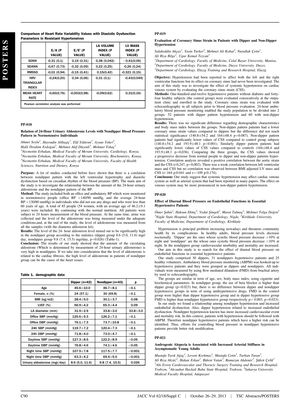Effect of Diurnal Blood Pressure on Endothelial Functions in Essential Hypertensive Patients
October 2013
in “
Journal of the American College of Cardiology
”

TLDR Blood pressure that doesn't drop at night is linked to worse blood vessel function in people with high blood pressure.
The document presents findings from a study that investigated the relationship between diurnal blood pressure patterns and endothelial function in essential hypertensive patients. The study included 30 dippers (patients whose systolic blood pressure decreases by more than 10% at night), 31 nondippers (patients whose systolic blood pressure decreases by less than 10% at night), and 25 healthy volunteers. All participants underwent ambulatory blood pressure monitoring (ABPM) and were assessed for endothelial function using flow-mediated dilatation (FMD) of the brachial artery. The results showed that the control group had higher FMD values than the dipper hypertensive group, and the dipper group had higher FMD values than the nondipper group (p=0.003 and p=0.023, respectively). The study concluded that nondipper hypertension is associated with increased endothelial dysfunction, which is also present in dipper hypertension but to a lesser extent. The findings suggest that nondipper hypertensive patients, who are at higher risk of cardiovascular events and mortality, should be closely monitored with ABPM to better manage their blood pressure and reduce risk.